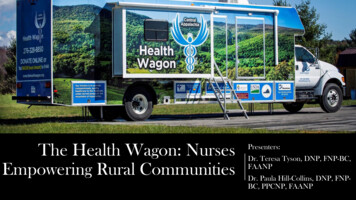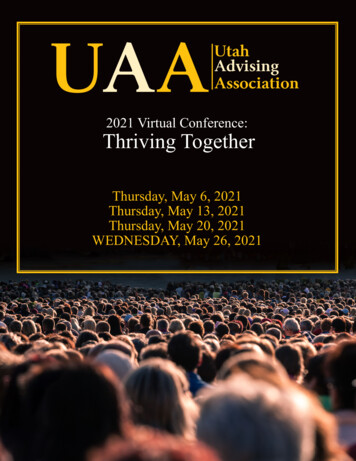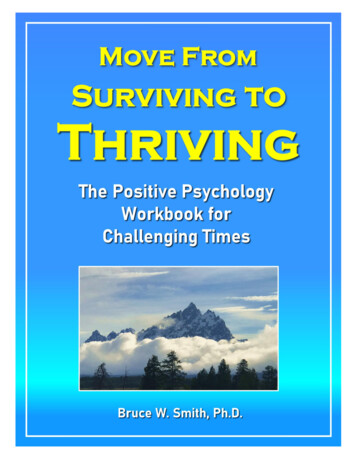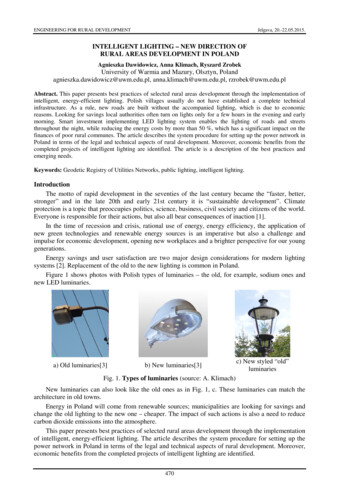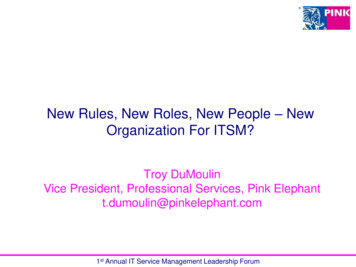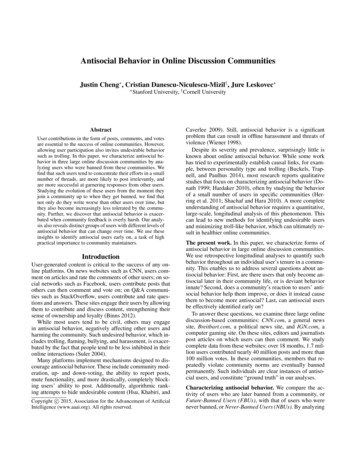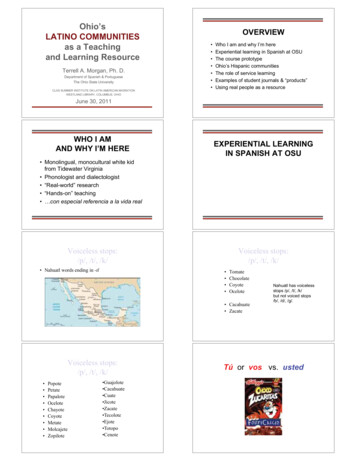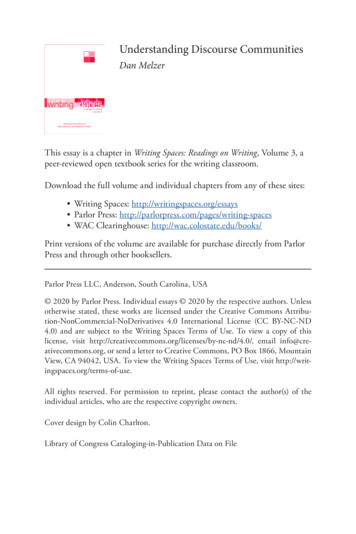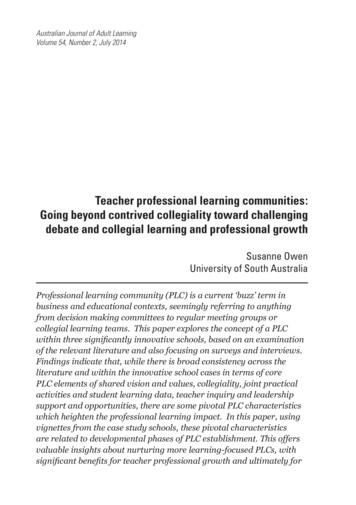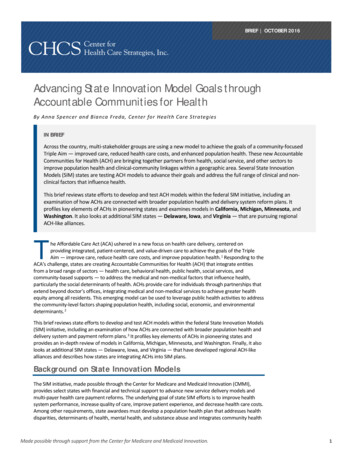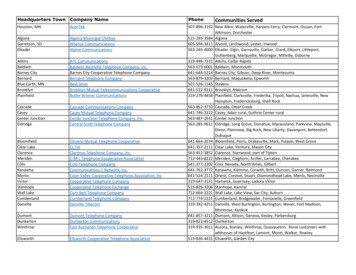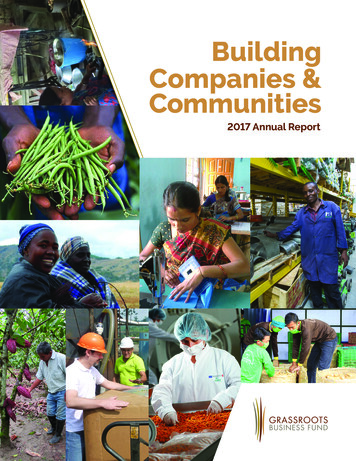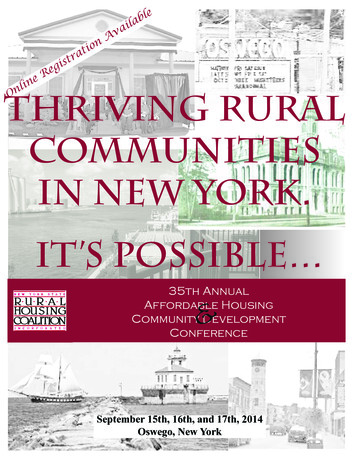
Transcription
lebilaanrtgiseReioatAvinlnOThriving ruralcommunitiesin New York.It’s possible 35th AnnualAffordable HousingCommunity DevelopmentConference&September 15th, 16th, and 17th, 2014Oswego, New York
In celebration of the 35th anniversary of the Rural Housing Coalition’s Annual AffordableHousing and Community Development Conference, we are taking up temporary residence bythe water, Oswego Harbor, that is. The beautiful location of the Lake Ontario Conference Center will be our home for this milestone event, overlooking the working harbor, and Lake Ontariobeyond. The adventurous are invited to bring your kayaks and test your mettle in the currents ofthe Oswego River, next to the hotels. Conference attendees have their choice of two adjacenthotels this year. AND, we are offering a special 2 day training at the start of the conference.Monday, September 15thTwo-Day Intensive Training: Asset Management CompliancePlease note: registration for this training requires an additional registration fee combined with the regularconference registration. The fee will admit asset management trainees to all conference events, includingworkshops taking place during the day after the completion of the asset management sessions. This certification training qualifies for 2 days of Continuing Education credit for the NDC Housing DevelopmentProfessional credential. Participation in the full 2 day training is required for certification. There is anadditional 100 fee for this training, in addition to the regular conference registration fee.9:00 AM - 5:00 PM Monday9:00 AM - 5:00 PM Tuesday This training has been developed specifically for senior managers of not for profitorganizations that operate rental housing supervised by either NYS Housing Trust Fund or the Homeless Housingand Assistance Program (HHAP). The training will be conducted by staff of the National Development Council with participation from HCR and HHAP and is based on the asset management course that is part of NDC’snational training program. Our intent is to provide training that will help asset managers maintain high quality,financially stable rental housing for the long haul. Lunch will be provided for Asset Management trainees bothdays. Dinner on Monday night is on your own. Space is limited to 50 participants, so please register early!Community Development Bus Tour2:00 - 5:00 PM Hop aboard our motor coach for a tour of exciting community development projects withinthe City of Oswego and in the surrounding countryside. Oswego County is routinely hit with some of the biggestweather challenges in the state, which affects not only the structural integrity of its housing stock, but makes itmuch more challenging to manage affordable housing, and attract new residents. Toss in a major state universitycenter, with thousands of young people descending on the community each year looking for rental housing, andyou have some incredible community development issues to overcome. Oswego’s local officials soldier on tomeet these challenges, as will be demonstrated by the projects we will visit. This tour is open to full conferenceregistrants who arrive in Oswego early. Space is limited, so please sign up early! Pre-registrants will be givenfirst priority on the bus, last minute attendees will be accomodated only if space is available.Rural Advocates Reception and Fundraiser5:00 - 8:00 PM Join your Rural Advocates colleagues for dinner, drinks and lively conversation at a venuenear the conference hotel. The work of the Rural Advocates is essential to the continued well-being of our ruralaffordable housing and community development network, but they can’t do it without our support. Advocateswill provide food and drink, and you supply the conversation and the 50 donation at the door.
Tuesday, September 16thTrack One: Single Family Housing9:00 - 10:30 AMPackaging 502 Mortgages and 502 Brokerage: Profit from PackagingHousing counseling agencies often struggle to find the necessary financial support for their assistance programs. Fee for service models are often touted as a solution to this problem, although not every service logicallylinks to an appropriate fee. However, Counselors that are working with first time home buyers to purchase a homeusing the Section 502 program can earn packaging fees, or earn greater benefits by participating in USDA RuralDevelopment’s brokerage program, which pays originators fees for the loan packaging work. This workshop willcover the processes involved in qualifying for participation in the brokerage program.10:45 AM - 12:15 PMPurchasing The Derelict: Financing Tools For Purchase And RehabilitationOf Uninhabitable PropertiesThe inability to find efficient financing for the purchase and rehabilitation of derelict homes is a majorroadblock to putting abandoned homes back into service, impacting both private home buyers and communitydevelopment organizations. LPA programs to acquire and rehabilitate derelict homes face a huge challenge infinding the up-front capital to undertake the construction work needed prior to marketing the homes to theireventual buyers. In some cases, individual homebuyers can be guided through the process of taking on the rehabof a derelict house without additional subsidy. This workshop will explore financing alternatives, including theFHA 203k program, which for years has been the primary financing tool combining construction period financingand the permanent loan. In addition, presenters will cover the USDA Section 502 Rehab mortgage, as well as theSONYMA version of the 203k.2:00 - 3:30 PMGuaranteed Rural Housing Mortgage Changes In The 3555 RegulationsThis session will review the benefits of becoming an approved lender and originator of USDA GuaranteedSingle Family Mortgages. In addition USDA will be issuing new regulations under Part 3555 that will be goinginto effect in September of this year. This workshop will cover the changes and how they will impact processing of guaranteed mortgages. The session will be useful for lenders who are considering becoming authorizedissuers of USDA-guaranteed mortgages, housing counselors that are packaging USDA guaranteed mortgages (orwould like to begin offering these mortgages to their clients), and lenders experienced in the guarantee programwho wish to stay on top of the recent changes to the regulations.3:45 - 5:15 PMUnderwriting Soft Seconds: Addressing LTV Roadblocks In ClosingAffordable Home SalesHow many times have you had an assisted home purchase for a first time homebuyer held up during the bankreview of the first mortgage application? Or if you are an underwriter, how often do you run into mortgageapplications that are simply over-leveraged because of the level and form of subsidy assistance provided by alocal community agency? This workshop will delve into the realities of LTV, exposure, lien position and federalrequirements that will impact the first mortgage underwriting decision.Track Two: Community Facilities9:00 - 10:30 AMCommunity Facilties 101: Introducing The RD Community FacilitiesProgramDid you know that USDA Rural Development offers loans and grants to finance a wide range of communityprojects including day care centers, senior nutrition sites, rural fire halls, and a whole host of other facilities?These projects are often co-funded with CDBG dollars. USDA and NYSHCR will present the ins and outs ofthe important Community Facilities Program.
Tuesday, September 16th10:45 AM - 3:30 PMCommunity Facilities Project ClinicsThe Department of Agriculture administers a variety of grant and loan programs in conjunction with CDBGthat support a broad array of community development initiatives for rural communities. Bring your project proposal or ideas, for one-on-one clinics with staff from the state office of USDA and NYSHCR. You may find thatyour dream project is feasible! You may sign up for a September 16th time slot to meet with USDA staff uponyour arrival at the conference. Please check for the sign-up sheet at the main Conference Registration Desk.3:45 - 5:15 PMRural Broadband: Is Your Community Plugged In?It’s the 21st Century and access to reliable broadband internet is essential to the economic well-being of allcommunities. As with electricity and telephone service in the past, internet providers find rural communitieslack the population concentration that would make providing broadband service to them profitable. Similar toefforts to broaden access to electricity and telephone service in the past, the State and Federal governments needto flex their regulatory and financial muscle to see that the internet reaches rural communities. Come and find outhow to make this happen in your community.Track Three: Mobile and Manufactured HomesIn a recent series of local trainings for nonprofit community development organizations held by the Coalitionaround the state, it became clear that mobile and manufactured housing represents a significant portion of theaffordable housing stock in the state, and that the existing programs and financial resources are not comprehensive enough to adequately meet all of the needs in our communities.2:00 - 3:30 PMMobile Home Replacement Vs. Mobile Home RehabilitationIn some cases, older mobile homes are clear cases for replacement- their deterioration is so severe that it doesn’tmake sense to invest additional money into the unit. In other cases, the useful life of an existing mobile home canbe extended with a more modest investment of public funds. This workshop will explore cases where it makesmore sense to rehab an older mobile home, will cover the in and outs of which repairs on a mobile home can becompleted by a typical contractor rather than a ‘licensed mobile home repairman’. In addition, this session willreview options for disability modifications in existing older mobile and manufactured homes.3:45 - 5:15 PMNonprofit Manufactured Home Dealer Model ProgramA Kentucky-based national program seeks to reduce the cost of mobile and manufactured housing replacementsthrough a unique partnership with several large manufacturers. The program, Next Step, helps local housingagencies to become licensed manufactured home dealers and installers, allowing them to purchase manufacturedand modular homes from the participating companies at wholesale cost. This offers significant cost savings oneach unit. This workshop will go over the manufactured home purchase process under this program, as well ascover the licensing process and other requirements of the program.Track Four: Making The Most Of Main Street9:00 - 10:30 AMThe Money Mix For Main StreetFinding the right mix of funds, including owner investment, to complete the renovation of deterioratingproperties in your community’s commercial district can be a challenge. NY Main Street is one option available,but not the only one. Learn how to blend owner capital with public resources including the Federal Home LoanBank CIP, historic preservation tax credits, and funding from the Empire State Development Corporation tocomplete your projects and have a downtown you can be proud of!
Tuesday, September 16thTrack Four, Continued10:45 AM - 12:15 PMHousing Above Main StreetMain Street revitalization theory relies on the development of housing in the vacant upper stories of downtowncommercial buildings as a key factor for success. What does that housing look like, though? Is it subsidizedapartments for seniors? Is it trendy one bedroom units for Millenials? Is it housing targeted to the retail workersthat staff the shops? Is it empty-nester market rate housing? Or is it some or all of the above? This workshopwill discuss the pros and cons of different tenant mixes in downtown upper stories.Luncheon12:30 - 2:00 PM. Lunch will include a panel discussion of key policy issues facing local leaders as they look tomeet the affordable housing and community development needs of rural and small town New York. The luncheonpanel will feature high level policy makers from the relevant State and Federal agencies and they will offer theirinsights as to what the future of rural development might look like.Reception and Banquet:6:00 PM Reception and Cash BarThe Conference reception is always a great opportunity to catch up with old friends from around the state andnetwork with other housing and community development professionals.7:00 PM Banquet and Keynote PresentationJoin us for a delicious meal celebrating the chance to get together, meet old friends, and chart new paths. Ofcourse, as is our custom, the Banquet will feature our Keynote presentation. Stay tuned for details.Wednesday, September 17thTrack Five: Disaster ResponseIt’s become an all-too-frequent news story: floodwaters racing down rural creekbeds smashing into villagesand hamlets that have been untouched by disaster in a century and a half; micro-burst windstorms and tornadoesracing through farms and neighborhoods; ice storms that turn vital communities into frozen wastelands.9:00 - 10:30 AMIt Happened To Me! (It Can Happen To You)“I woke up one morning to find the power was out. Then I discovered that there was a car sticking out of asinkhole down the block. I dodged the downed power lines to run to the office to see if the building was stillstanding. It was, but the basement was flooded and there was no heat. My cell rang, and it was the Mayor, in tears.We need your help, she said, and fast.” Learn from housing agency directors that have been there. What shouldyou expect when the worst happens?10:45 AM - 12:15 PMLessons From LI: Building Disaster Resiliency Into Rehab DesignIn response to the numerous floods, hurricanes, tornadoes, micro-bursts, and ice storms that have struck in NewYork in recent decades, NY Rising has supported efforts of impacted communities to innovate creative reconstruction responses that will allow those communities to survive the next, inevitable, disaster either unscathed,or with significantly reduced levels of damage. Best practices are now coming from those local community responses. Learn how you can incorporate some of these best practices in your housing rehabilitation spec writing,so that all your good work isn’t undone in the next weather catastrophe.
Wednesday, September 17thTrack Six: Non-Profit ManagementIt’s not getting any easier to manage a 501 (c) 3 on a day to day basis. Compliance with reporting andtransparency requirements is becoming increasingly difficult, at the same time that organizations are comingunder increasing scrutiny to ensure that they make sound financial decisions.9:00 - 10:30 AMThe Non-Profit Revitalization Act of 2013In January of 2014, all non-profits in New York became subject to the provisions of this new state law, which isintended to ensure accountability of the non-profit sector to the community. This workshop will cover the requirements outlined in the new law, to make sure that you keep your organization in good standing.Track Seven: The HOME ProgramDespite significant reductions in federal support for the HOME program in recent years, this program remainsone of the most important federal funding tools available for affordable housing production and preservation.9:00 - 10:30 AMHOME Program UpdateThe HOME program has gone through a number of changes in recent years and months, reflectingmodifications at the federal level. This workshop will cover recent changes on CHDO status, as well as changesthat impact how you access and use this important source of affordable housing funding.10:45 AM - 12:15 PMHOME FAQsNew RULES for the HOME program you may have to operate your program differently than in the past.These changes may affect daily operation and how you deliver HOME funded programs within your local community. Attend a NYS HOME Local Program FAQ session to hear how to “make it work.” Questions presubmitted by Local Program Administrators will be asked and answered in a roundtable discussion with AnnPetersen, Director, NYS HOME Local Program and staff.ClinicsNYSHCR administers a variety of grant initiatives under the AHC, RESTORE, and Access To Home programsthat support a broad array of housing activities. Bring your project proposal or ideas, for one-on-one clinics withstaff from NYSHCR. You may find that your dream project is feasible! You may sign up for a time slot to meetwith state staff upon your arrival at the conference. Please check for the sign-up sheet at the main ConferenceRegistration Desk.Luncheon and Annual Meeting12:30 - 2:00 PMThe Rural Housing Coalition’s Annual Meeting will beheld during the luncheon on September 17th, including election of board membersto the Board of Directors. Our invited lunch speaker is New York State Homes andCommunity Renewal Commissioner Darryl Towns.Rural Housing Coalition Board Meeting2:00 - 3:30 PM The organizational meeting of the Rural Housing Coalition Board of Directors will take placefollowing the annual meeting.
Conference RatesFull Conference Rate:Asset Management Training:Banquet Only:Includes Tuesday luncheonand banquet, and WednesdayluncheonA Great Value! 245 for Coalition membersl 285 for Non-membersIncludes Monday, Tuesdayand Wednesday luncheonsplus Tuesday banquet.Attendance at the Tuesdayevening banquet is availablefor an additional 75.00 345 for all. Includes fullconference registration.Join the Coalition today and take advantage of member-discounted conference rates. Membershipin the Coalition is just 350 per year for Rural Preservation Companies and 125 for all others! Formembers only: Register 3 Full Conference Rate attendees from your agency, and get a 4th Full ConferenceRegistration for FREE!Online RegistrationRegister Online!All registrations for the 2014 Conference will takeplace online at Constant Contact (The URL is found below. A direct link may be found at our website at www.ruralhousing.org). At this registration site, you will beable to pay by major credit card. Upon completion ofyour online registration, you will receive an email confirmation of your registration.Payment InformationRegistrants have the option of paying by major creditcard using Paypal through our online registration system at ConstantContact.com (See URL below). Forthose who prefer to pay by check, please make checkspayable to the New York State Rural Housing Coalition, Inc., and send to:NYS Rural Housing Coalition, Inc.79 North Pearl St. 3rd FloorAlbany, New York 12207Please include a copy of your registration confirmationwith your check, to ensure that the payment is creditedto the proper account.Conference MealsConference meals include the banquet on Tuesdayand luncheon buffets on Tuesday and Wednesday. Attendees of the Asset Management Certification trainingwill also receive lunch on Monday. Monday dinner willbe on your own, although you may wish to participatein the Rural Advocates fundraiser on Monday evening.Banquet attendees will have their choice of duet of beefand chicken or our vegetarian option. Please be sure toselect your choice when you register online.Refund Policy and Special NeedsAll cancellations must be requested in writing. A fullrefund will be provided to anyone whose cancellation isreceived by COB September 8th, 2014. No refunds willbe made after September 8th. If you have any specialneeds or requirements, including those covered by theAmericans with Disabilities Act, or special dietary requirements, please inform the Coalition by September12th at colin@ruralhousing.org.A separate registration must be submitted for each attendee.Online registrations close at midnight on September 12th.Online Registration is available ?llr 87dbbwfab&oeidk a07e9jipeyraf7e2e81On-site registration will also be available, although pre-registration is recommended as some events havelimited seating. Early registration is recommended to avoid being shut out of popular sessions. For additionalinformation, contact the Rural Housing Coalition office at (518) 458-8696. For up-to-the-minute
FHA 203k program, which for years has been the primary financing tool combining construction period financing and the permanent loan. In addition, presenters will cover the USDA Section 502 Rehab mortgage, as well as the SONYMA version of the 203k. 2:00 - 3:30 PM Guarante
